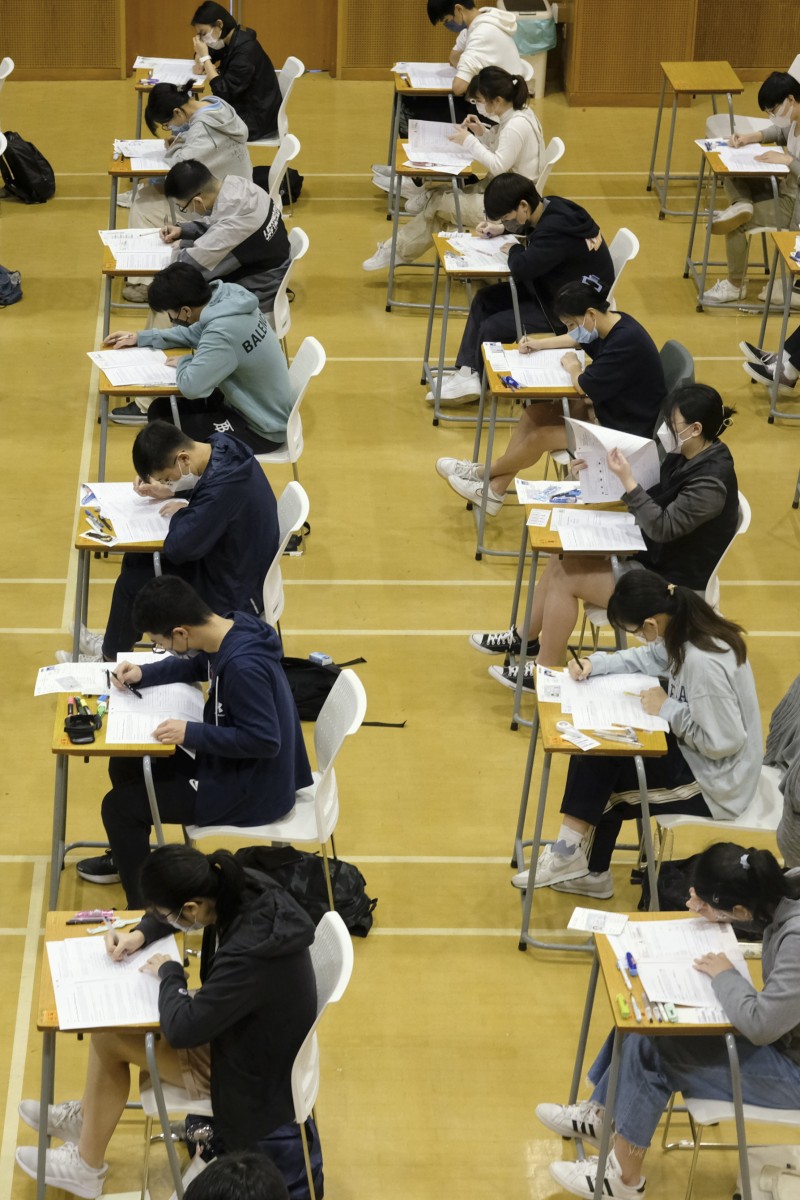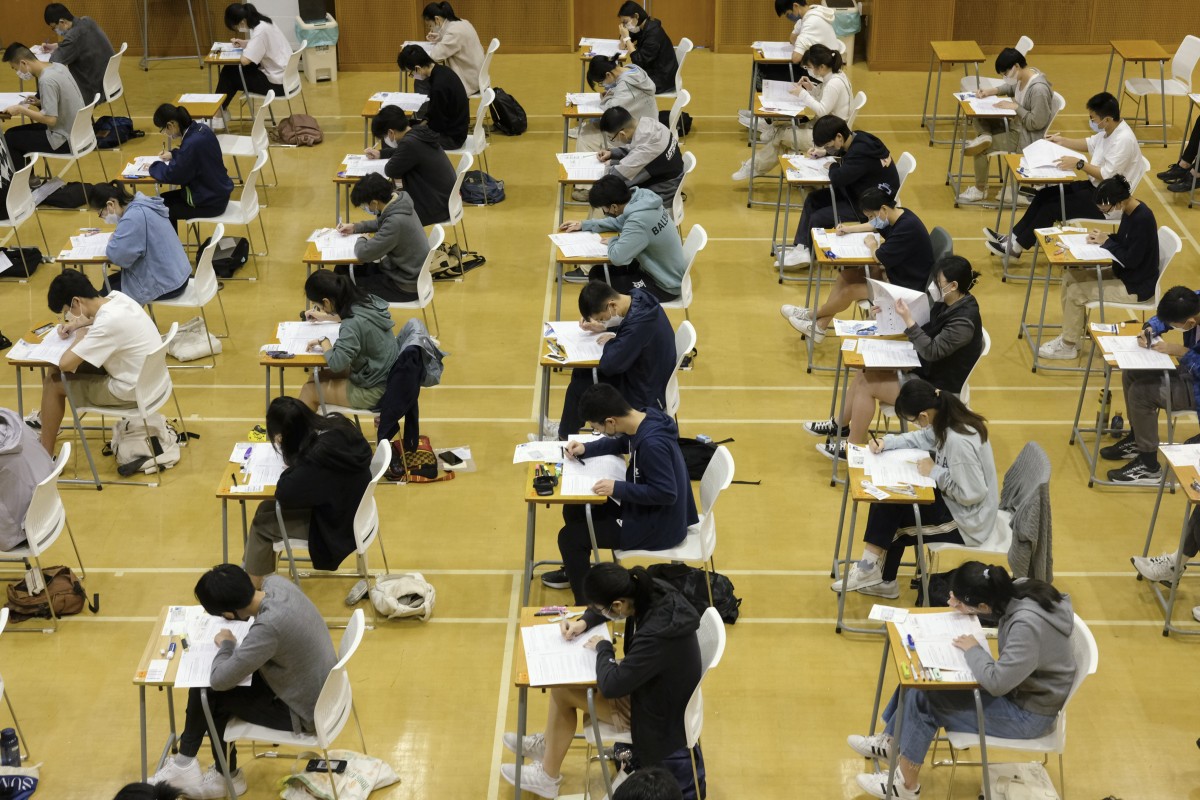
DSE 2023: Check out a round-up of the economics, biology, and other papers you did this week
- This year’s chemistry paper was slightly more challenging than in previous years, one tutor said
- Biology exam was straightforward for students who studied well, while economics contained few surprises
 Check out our wrap up of this week’s DSE exams. Photo: Handout
Check out our wrap up of this week’s DSE exams. Photo: HandoutThe second week of the month-long Diploma of Secondary Education (DSE) examinations concluded on Friday, with about 47,500 candidates sitting the bulk of the science and finance-related elective subjects.
Subjects tested this week included economics; chemistry; biology and business, accounting and financial studies (BAFs).
Apart from chemistry, which was slightly more challenging than in the past, most candidates found the remaining subjects manageable and on par with previous years.
Miranda Li Xiangyu from Heep Yunn School breathed a sigh of relief when she finally completed her economics exam on Tuesday, saying it was one of her weakest subjects.
“Economics is not my best elective since I don’t have that kind of business acumen. But even if I score badly in economics, I will not include this subject in my best five. This means that I still have room for mistakes,” said the 18-year-old student.
Moving forward, Li hopes to achieve top grades for Chinese history on Wednesday, May 10, and history on May 15. Her goal is to study history at either Chinese University, the University of Hong Kong or Lingnan University.
The DSE examinations will continue on Saturday, with candidates sitting for other elective subjects, including geography, physics and Chinese history.
The results of this year’s DSE exams will be released on July 19.
Candidates warned over taking photos after students, teachers celebrate final liberal studies exam
Here’s a wrap-up of the subjects tested in the past week
Economics
The difficulty level of this year’s economics exam was on par with previous years and contained few surprises.
“The topics covered in Paper 1 were standard,” said Daniel Yu, an experienced tutor at King’s Glory Education Centre, adding that the most challenging were Question 14, about price elasticity of demand and Question 29, about the graphical analysis of money markets.
The tutor said the number of students who earn a level 3 or above should be similar to last year, which was 66.4 per cent. “The overall mean score of Paper 1 from 2020 to 2022 was 26-28 out of 45. It will be more or less the same range in 2023.”
For Paper 2, Yu expected the overall mean score range to fall between 60 to 62 per cent, similar to previous years. “Well-prepared candidates would be delighted to see Section A [of Paper 2] coming out with not much surprise and [to see] their hard work and preparation have paid off.”
Chemistry
Kevin Lau from Beacon College said this year’s chemistry exam was “slightly more difficult” than previous years.
“Personally, I predict that candidates can get a 5** in this year’s chemistry exam if they get 87 per cent [of the questions] correct,” he said, adding that the exam was still easier than some of the more challenging ones in the past, which required candidates to get around 84 per cent of questions correct to get a top grade.
The tutor added that although many questions were similar to those on past exams, a few multiple-choice questions in Paper 1A could have presented a few challenges, as they were new question types. He singled out Questions 17, 27, 32 and 35, which tested candidates on complex concepts.
“Students could not give a precise answer simply from practising past papers. They really needed to get the gist of the concepts to give the right answer,” he said.
One of the trickiest questions on Paper 2 included part two under Question 1C, as it required candidates to deduce the reaction order.
Kathleen Wong, a DSE candidate who took chemistry, biology and English literature, was relieved to find that the chemistry exam was “easier than expected”.
“I’m not very good at chemistry to begin with, so I usually expect it to be challenging for me,” said the 17-year-old student, adding that it was “a little easier” than her school’s mock exam.
The candidate predicted she would receive a Level 4 in chemistry, the same result as her mock exam.
BAFs
According to Beacon College’s seasoned tutor Andy Yeung, the difficulty of Paper 1, which consisted of multiple-choice and short-answer questions, was similar to that of the past two years. There were no new question types, though some might have thrown students off guard. One example was Question 30, which had a three-level organisational chart instead of the two levels most candidates are used to.
“Students may also have been confused by the words used in level C [of the chart]. The words ‘Chinese’, ‘Korean’, and ‘Japanese’ refer to the different product lines, not countries or nationalities,” Yeung said, adding that the correct answer was A (staff; product) and not B (staff; location).
Yeung also expressed some disappointment in Paper 1: “Many students focused their revision on the stock market and investment market in Hong Kong, but these topics were not emphasised.”
He shared that many of his students found the multiple-choice questions manageable in terms of difficulty and were able to finish the paper on time: “I suppose the cut-off for a 5** this year will be 26 or 27 out of 30 questions instead of last year’s 25 points,” he said.
Yeung noted an interesting twist in Paper 1’s short-answer questions, most notably Question 3, which usually asks about personal finance. “This year, it was about business management. HKEAA placed a lot less emphasis on personal finance this year because the topic only appeared in Part 2’s optional questions and only carried four marks. Those who focused on personal finance this year will definitely be disappointed.”
Feeling anxious or depressed after your big exam? You’re not alone
The tutor also singled out Question 5, about income statements, saying it was the first time in DSE history that students were tested on the financial statement of a service company instead of a trading company.
As for Paper 2, its level of difficulty was similar to previous years. One point worth noting was the importance of being adequately prepared to answer cost accounting questions, as this would give candidates an edge should any of the financial accounting questions seem too challenging.
“Students should be able to score [well] on this year’s BAFs as long as they have answered according to the scenarios provided and exercised proper time management when attempting Paper 2,” he said.
Biology
This year’s biology exam was of “moderate” difficulty, according to Michael Ho, a tutor from King’s Glory Education Centre.
While most questions were straightforward for students who studied well, some were a little trickier.
For example, on Paper 1A, which consisted of multiple-choice questions, Questions 2 and 3 asked about radioactivity, the pancreas cell and the small intestine.
“This was taught in the first semester of Form Four, so students might have been caught off guard as they usually revise topics from Form Five and Six better,” Ho said.
Another interesting, albeit more challenging question, could be found in Paper 1B. It asked about a whale fall, referring to how the carcass of a whale on the ocean floor could decompose and become a source of nutrition.
“I think if you asked any student about the most challenging question or [the one they were most unsure about], this would be it,” Ho said.
Question 1B on Paper 2 was also difficult, he added.
DSE 2023: ‘Bittersweet’ farewell to controversial liberal studies subject
It asked for the thermoregulatory response of a resting group and exercise group of volunteers and included a graph showing their skin blood flow rate against temperature.
“Students might have been puzzled about why the exercise group’s blood flow rate decreased when their body temperature rose. But what they’re forgetting is that the body is performing different activities at the same time,” Ho said.
Another challenging task was Question 2B, which asked students about eco-engineered tiles and their relationship to the biodiversity of the shoreline.
DSE 2023: To ace history exam, make sure your essays are well-structured
“This was an unfamiliar topic that schools might not have taught. Students could have been caught off guard thinking that they missed the topic at school,” he said.
But overall, this year’s paper was less challenging than last year’s, the tutor said.
The DSE examinations continue on Saturday, with candidates sitting for other elective subjects, including geography, physics and Chinese history.